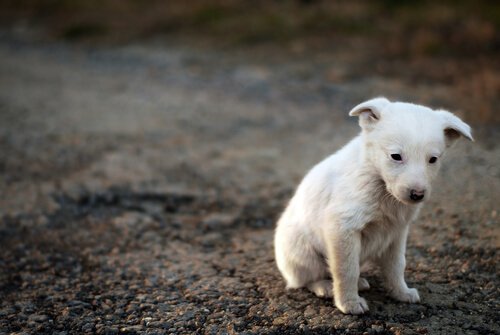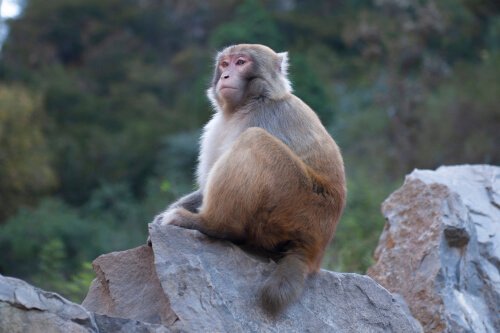Animal Consciousness: Are They Aware of Their Suffering?

Are animals aware of their suffering? Believe it or not, many of us have wondered this at least once. It’s safe to say that anyone who’s ever had a pet or loved an animal is 100% sure of the answer to this question. However, what does neuroscience say about this? Does science actually ensure and support the fact that animals have a consciousness of their own and that they’re aware of what goes on inside of them?
Neuroscience has more than conclusive proof that all mammals, birds, and other species are aware of their own suffering. Animal consciousness is not a recent topic, by the way. In 2013, the Cambridge Declaration on Consciousness put this issue on the table.
Researchers have identified homologous circuits in humans and animals whose activity coincides with conscious experience. It seems that the neural circuits that are activated while an animal feels an emotion are the same ones that activate in humans. Renowned neurologists from all over the world support this study and agree that animals are, in fact, aware of their own suffering.
“I am in favor of animal rights as well as of human rights. That is the way of a whole human being.”
-Abraham Lincoln-
The Cambridge Declaration on Consciousness
On July 7th, 2012, a group of renowned scientists signed the Cambridge Declaration on Consciousness. This document states that not only humans but also a significant number of animals, including vertebrates and invertebrates, are sentient beings. This means that they’re conscious of their experiences and that, in addition, they can have positive or negative mental states.
There is a scientific consensus on the evidence that demonstrates that animals possess neuroanatomical, neurochemical, and neurophysiological substrates of conscious states, along with an ability to exhibit intentional behaviors. In other words, humans aren’t the only ones to possess neural substrates that generate consciousness.

Philip Low, founder and CEO of the neurodiagnostic company NeuroVigil in California, Christof Koch of Seattle’s Allen Institute for Brain Science, David Edelman, of the La Jolla Neurosciences Institute, and other prestigious neuroscientists signed the Cambridge Declaration of Consciousness.
It has been confirmed that the capacity to have positive and negative experiences is what makes a being conscious.
“Not a single creature on earth has more or less right to be here.”
-Anthony Douglas Williams-
Recent studies on the matter
Many studies continue to confirm these facts. In 2016, Jarrod Bailey and Shiranee Pereira presented an investigation about brain circuits related to emotions and empathy in dogs. This study confirms and extends the conclusions of the Cambridge Declaration on Consciousness.
INRA, along with the European Food Safety Authority, also carried out a study on animal consciousness. They exposed the results to the public in 2017 in Parma, Italy. This piece of research corroborates that animals are equipped with nervous systems that support conscious processes of complex information, including negative emotions caused by nociceptive stimuli.
This study analyzed different species including primates, corvids, rodents, and ruminants. The researchers concluded that animals with autobiographical memory, such as primates, corvids, and rodents, may have desires and goals that extend to the past and future. As a consequence, they may be deeply affected by aversive experiences.

Animal consciousness is real
Those who mistreat animals defend their actions by saying that animals don’t feel anything. However, after seven years of more than solid evidence about animal consciousness and the multitude of subsequent studies supporting this statement, this is no longer an excuse to defend animal abuse.
All those people who treat animals as objects, mistreat them, and abuse them in different ways should seek other arguments to defend themselves because science doesn’t support them in the slightest. Moreover, the regulation of animal rights, animal protection, and animal welfare has had a huge legal impact. Basically, all the studies and evidence we mentioned here is being turned into laws.
It seems that, despite the complexity of studying human consciousness, from now on, it will be studied along with animal consciousness.
“We can judge the heart of a man by his treatment of animals.”
-Emmanuel Kant-
Are animals aware of their suffering? Believe it or not, many of us have wondered this at least once. It’s safe to say that anyone who’s ever had a pet or loved an animal is 100% sure of the answer to this question. However, what does neuroscience say about this? Does science actually ensure and support the fact that animals have a consciousness of their own and that they’re aware of what goes on inside of them?
Neuroscience has more than conclusive proof that all mammals, birds, and other species are aware of their own suffering. Animal consciousness is not a recent topic, by the way. In 2013, the Cambridge Declaration on Consciousness put this issue on the table.
Researchers have identified homologous circuits in humans and animals whose activity coincides with conscious experience. It seems that the neural circuits that are activated while an animal feels an emotion are the same ones that activate in humans. Renowned neurologists from all over the world support this study and agree that animals are, in fact, aware of their own suffering.
“I am in favor of animal rights as well as of human rights. That is the way of a whole human being.”
-Abraham Lincoln-
The Cambridge Declaration on Consciousness
On July 7th, 2012, a group of renowned scientists signed the Cambridge Declaration on Consciousness. This document states that not only humans but also a significant number of animals, including vertebrates and invertebrates, are sentient beings. This means that they’re conscious of their experiences and that, in addition, they can have positive or negative mental states.
There is a scientific consensus on the evidence that demonstrates that animals possess neuroanatomical, neurochemical, and neurophysiological substrates of conscious states, along with an ability to exhibit intentional behaviors. In other words, humans aren’t the only ones to possess neural substrates that generate consciousness.

Philip Low, founder and CEO of the neurodiagnostic company NeuroVigil in California, Christof Koch of Seattle’s Allen Institute for Brain Science, David Edelman, of the La Jolla Neurosciences Institute, and other prestigious neuroscientists signed the Cambridge Declaration of Consciousness.
It has been confirmed that the capacity to have positive and negative experiences is what makes a being conscious.
“Not a single creature on earth has more or less right to be here.”
-Anthony Douglas Williams-
Recent studies on the matter
Many studies continue to confirm these facts. In 2016, Jarrod Bailey and Shiranee Pereira presented an investigation about brain circuits related to emotions and empathy in dogs. This study confirms and extends the conclusions of the Cambridge Declaration on Consciousness.
INRA, along with the European Food Safety Authority, also carried out a study on animal consciousness. They exposed the results to the public in 2017 in Parma, Italy. This piece of research corroborates that animals are equipped with nervous systems that support conscious processes of complex information, including negative emotions caused by nociceptive stimuli.
This study analyzed different species including primates, corvids, rodents, and ruminants. The researchers concluded that animals with autobiographical memory, such as primates, corvids, and rodents, may have desires and goals that extend to the past and future. As a consequence, they may be deeply affected by aversive experiences.

Animal consciousness is real
Those who mistreat animals defend their actions by saying that animals don’t feel anything. However, after seven years of more than solid evidence about animal consciousness and the multitude of subsequent studies supporting this statement, this is no longer an excuse to defend animal abuse.
All those people who treat animals as objects, mistreat them, and abuse them in different ways should seek other arguments to defend themselves because science doesn’t support them in the slightest. Moreover, the regulation of animal rights, animal protection, and animal welfare has had a huge legal impact. Basically, all the studies and evidence we mentioned here is being turned into laws.
It seems that, despite the complexity of studying human consciousness, from now on, it will be studied along with animal consciousness.
“We can judge the heart of a man by his treatment of animals.”
-Emmanuel Kant-
This text is provided for informational purposes only and does not replace consultation with a professional. If in doubt, consult your specialist.







